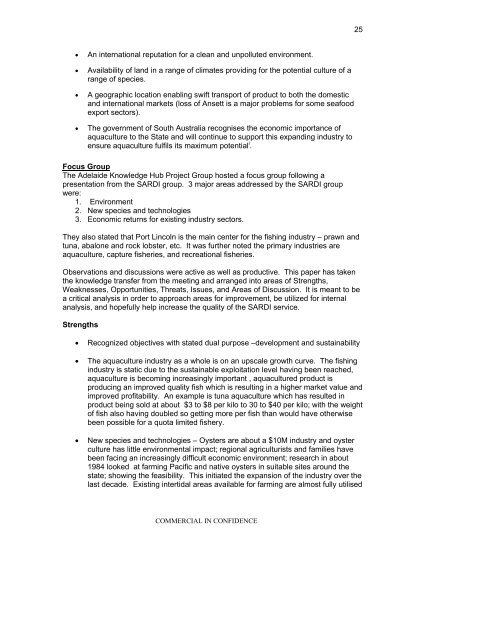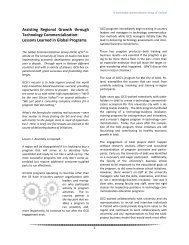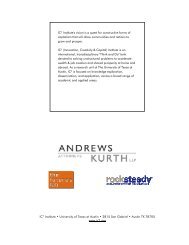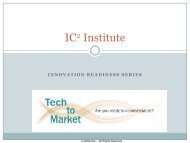“Quicklook” Assessment of Greater Adelaide's Assets & Challenges ...
“Quicklook” Assessment of Greater Adelaide's Assets & Challenges ...
“Quicklook” Assessment of Greater Adelaide's Assets & Challenges ...
You also want an ePaper? Increase the reach of your titles
YUMPU automatically turns print PDFs into web optimized ePapers that Google loves.
• An international reputation for a clean and unpolluted environment.<br />
• Availability <strong>of</strong> land in a range <strong>of</strong> climates providing for the potential culture <strong>of</strong> a<br />
range <strong>of</strong> species.<br />
• A geographic location enabling swift transport <strong>of</strong> product to both the domestic<br />
and international markets (loss <strong>of</strong> Ansett is a major problems for some seafood<br />
export sectors).<br />
• The government <strong>of</strong> South Australia recognises the economic importance <strong>of</strong><br />
aquaculture to the State and will continue to support this expanding industry to<br />
ensure aquaculture fulfils its maximum potential i .<br />
Focus Group<br />
The Adelaide Knowledge Hub Project Group hosted a focus group following a<br />
presentation from the SARDI group. 3 major areas addressed by the SARDI group<br />
were:<br />
1. Environment<br />
2. New species and technologies<br />
3. Economic returns for existing industry sectors.<br />
They also stated that Port Lincoln is the main center for the fishing industry – prawn and<br />
tuna, abalone and rock lobster, etc. It was further noted the primary industries are<br />
aquaculture, capture fisheries, and recreational fisheries.<br />
Observations and discussions were active as well as productive. This paper has taken<br />
the knowledge transfer from the meeting and arranged into areas <strong>of</strong> Strengths,<br />
Weaknesses, Opportunities, Threats, Issues, and Areas <strong>of</strong> Discussion. It is meant to be<br />
a critical analysis in order to approach areas for improvement, be utilized for internal<br />
analysis, and hopefully help increase the quality <strong>of</strong> the SARDI service.<br />
Strengths<br />
• Recognized objectives with stated dual purpose –development and sustainability<br />
• The aquaculture industry as a whole is on an upscale growth curve. The fishing<br />
industry is static due to the sustainable exploitation level having been reached,<br />
aquaculture is becoming increasingly important , aquacultured product is<br />
producing an improved quality fish which is resulting in a higher market value and<br />
improved pr<strong>of</strong>itability. An example is tuna aquaculture which has resulted in<br />
product being sold at about $3 to $8 per kilo to 30 to $40 per kilo; with the weight<br />
<strong>of</strong> fish also having doubled so getting more per fish than would have otherwise<br />
been possible for a quota limited fishery.<br />
• New species and technologies – Oysters are about a $10M industry and oyster<br />
culture has little environmental impact; regional agriculturists and families have<br />
been facing an increasingly difficult economic environment; research in about<br />
1984 looked at farming Pacific and native oysters in suitable sites around the<br />
state; showing the feasibility. This initiated the expansion <strong>of</strong> the industry over the<br />
last decade. Existing intertidal areas available for farming are almost fully utilised<br />
COMMERCIAL IN CONFIDENCE<br />
25





